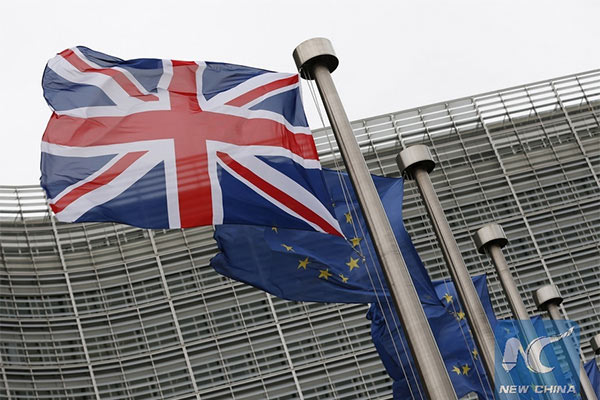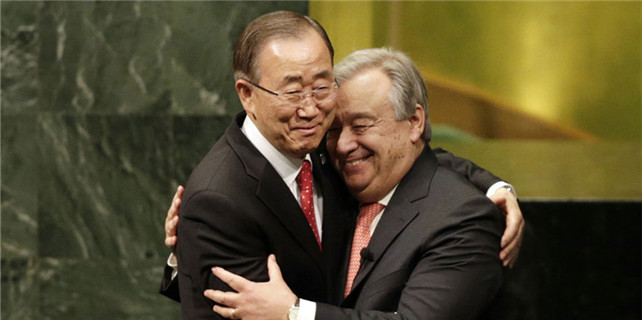Brexit means UK must be active on the Belt and Road
 |
|
Photo taken on Jan 29, 2016 shows the UK and EU flags outside the European Commission headquarters in Brussels, Belgium.[Photo/Xinhua] |
In 2016, China's international ambitions benefited from British finesse in the service industry, and Britain will likely nurture this symbiosis as it navigates its way out of Europe.
Former Chief Secretary to the Treasury Liam Byrne said in November that if the UK wishes to prosper outside the European Union, it would be wise to actively participate in China's Belt and Road international development strategy, an initiative proposed by President Xi Jinping in 2013 that focuses on connectivity and cooperation among countries geographically close to China.
China has valued the UK as an active partner in its cross-border economic and infrastructure vision, ever since former Chancellor George Osborne announced in March 2015 Britain's plans to join the China-led Asia Infrastructure Investment Bank.
The move was followed up seven months later by a further show of support when Lord Sassoon, a Conservative peer with extensive Chinese business links, presented Xi with the China-Britain Business Council's report on the Belt and Road Initiative.
UK-based legal firms are likely to play a role, as they already have, in the multitude of cross-border transactions that will be essential to the success of the Belt and Road Initiative. In a deal that closed in March, for example, UK firm Herbert Smith Freehills provided legal services connected to the Silk Road Fund's acquisition of a stake in Russian natural gas producer Novatek.
And, ending in April, London-headquartered firm Linklaters provided legal advice for a $1.95 billion deal for the Thar Block II mining and energy project in Pakistan. The deal involved banks from China and Pakistan lending in both the dollar and rupee.
Deals of such complexity will become increasingly common as the Belt and Road Initiative moves forward, and the UK's expertise in financial services will be of huge value. Belt and Road construction projects will also require dependable access to trusted materials suppliers.
The London Metal Exchange, the world's center for industrial metals trading, agreed in October to coinvest with existing partners on warehouse construction along the Belt and Road route. The LME is launching the LMEshield program in China with leading State-owned warehousing company CMST.
Running through 2017, the pilot project will ensure secure receipting on commodities across CMST's warehouses. Eventually, the plan is to have the LME manage warehouse receipts and fraud control.
China also collaborated with the UK on an ecommerce component of the Belt and Road Initiative. After opening in late 2015, Alibaba's UK office began its work in earnest this year. From London's Covent Garden, workers have assisted British businesses in exploiting China's vast online market.
In September, China's ambassador to the UK, Liu Xiaoming, described the relationship between the UK and China as a "win-win partnership".
"The UK has strong high-tech and financial sectors and has an edge in brand promotion and creative industry," he said. "China has a big labor force and market, and the size of its economy comes with a strong financing capability."
As Byrne commented, if the UK remains open to this exchange of resources and expertise, it may greatly lessen economic wounds as it extracts itself from the European Union.
- EU agrees on approach to Brexit talks, PM May left out in cold
- Westminster committee says transitional period pivotal for British financial services
- European Parliament must be involved in Brexit talks: lawmaker
- Chinese property investors say they are not spooked by Brexit fears
- UK business calls for exclusive visa system for post-Brexit London






















